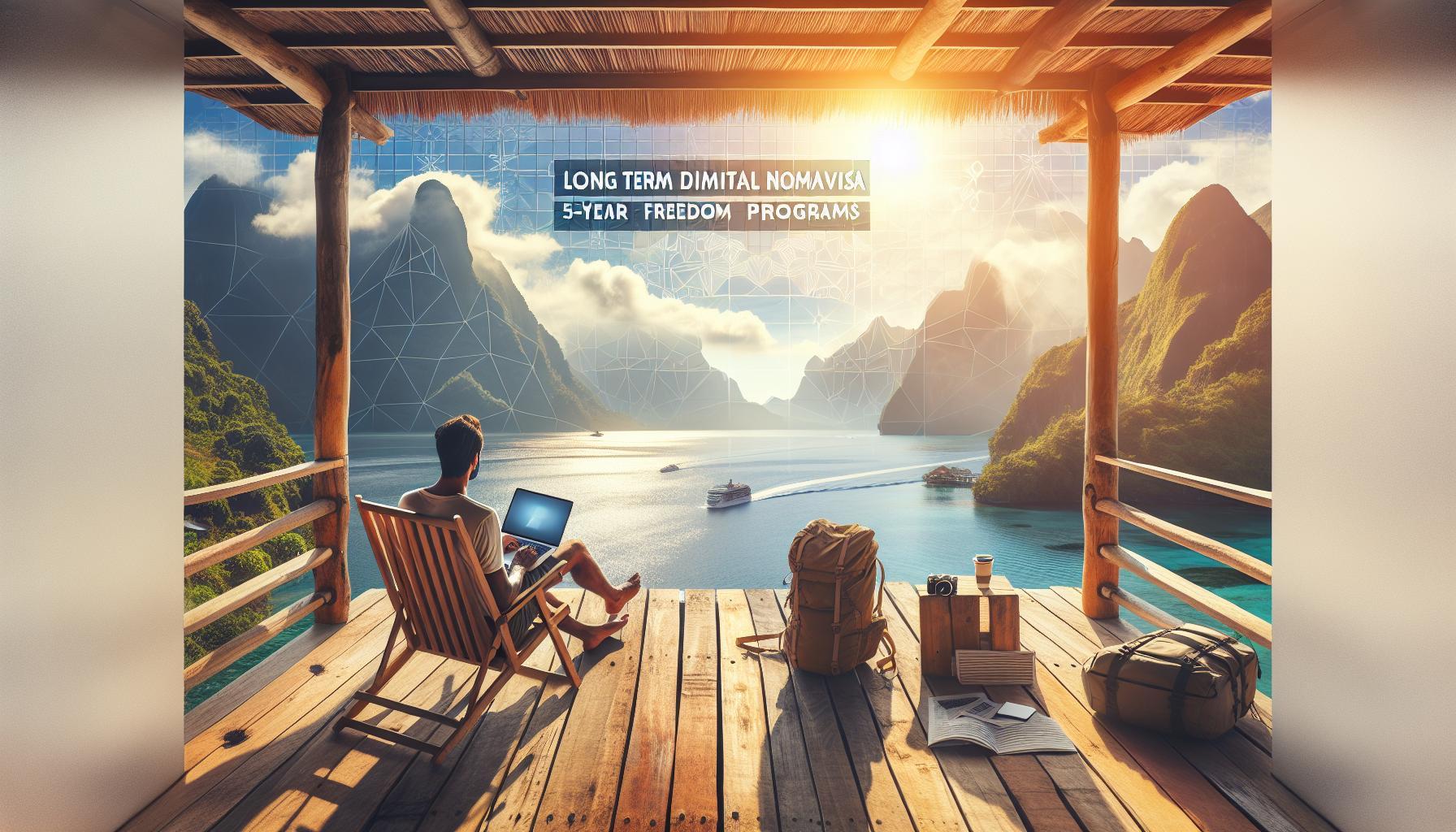Imagine exploring new cultures, waking up to breathtaking landscapes, and working from the beach, all while securing a stable living. Long-term digital nomad visas, particularly those offering 5-year freedom programs, provide the perfect solution for remote workers seeking flexibility and adventure. These programs allow you to immerse yourself in a destination without the constant worry of visa renewals, giving you the freedom to truly live and work abroad.
With more countries recognizing the growing trend of remote work, these visas offer a range of benefits-from tax incentives to vibrant expat communities. For those eager to escape the confines of traditional office life, understanding how to navigate the visa application process becomes essential. Whether you’re a seasoned nomad or just stepping into this lifestyle, the promise of significant time in your chosen country beckons. Dive into the details of these long-term visas and discover how they can transform your work-life balance for the better.
Long Term Digital Nomad Visa Benefits Explained
Embracing the opportunity to work remotely while exploring new countries can transform your life, and long-term digital nomad visas-especially those lasting up to five years-offer a remarkable pathway to achieve this dream. These visas not only grant you the legal right to reside and work remotely but also eliminate the stress of constantly renewing shorter tourist visas. Imagine waking up to a beach view in Bali one month, then experiencing the vibrant streets of Lisbon the next, all while maintaining your professional commitments.
One of the most significant benefits of these long-term visas is stability. With the ability to stay in a country for several years, you can immerse yourself in the local culture, build lasting relationships, and create a more routine lifestyle compared to the often frenetic pace of short-term travel. This stability can lead to better mental health, as you can cultivate a balanced work-life relationship rather than constantly feeling on the move. Moreover, many countries offering these visas have specific friendly policies for digital nomads, providing coworking spaces, networking events, and social meet-ups tailored to remote workers, which can significantly enhance your professional connections and personal growth.
Additionally, extended stays in foreign countries can lead to cost savings. Many digital nomads find that their expenses decrease when living in regions with a lower cost of living compared to their home country. Moreover, access to local markets, communities, and resources can provide unique opportunities for personal and professional development that short-term tourists might miss. For instance, you could engage in local language courses, cultural activities, or workshops that deepen your understanding of the country and its people, all while continuing to work effectively.
In conclusion, long-term digital nomad visas are more than just legal documents; they open doors to a fulfilling lifestyle that blends work and adventure. They grant freedom and flexibility, enriching your personal and professional life while building a sense of community in your chosen new home. Embrace this chance not just to travel but to live fully in the moment, create lasting memories, and build a career that lets you explore the world on your terms.
Top Countries Offering 5-Year Digital Nomad Visas
An increasing number of countries recognize the value of attracting digital nomads by offering extended visa options, including those that allow stays of up to five years. These visas provide remote workers the opportunity to enjoy a consistent lifestyle abroad while fulfilling their professional obligations. Countries like Portugal, Spain, Estonia, and Mexico have become popular among digital nomads, offering not just legal residency but also vibrant communities and exceptional quality of life.
Portugal
Portugal, particularly its capital Lisbon and the picturesque Porto, has emerged as a top destination due to its affordable cost of living, friendly locals, and thriving expat community. The D7 visa allows non-EU citizens to stay for up to five years. With a growing number of coworking spaces and networking opportunities specifically catered to remote workers, Portugal offers both the infrastructure and social environment ideal for a balanced digital nomad life.
Spain
Spain’s Digital Nomad Visa facilitates stays of up to five years, promoting cities like Barcelona and Valencia for their culture, climate, and digital infrastructure. The process is straightforward, requiring proof of employment or business ownership outside Spain, which resonates well with many digital nomads looking for a stable base in Europe.
Estonia
Estonia’s Digital Nomad Visa targets long-term travelers interested in working remotely for foreign companies. Offering an initial stay of up to one year, with the potential to extend it thereafter, this initiative not only reflects Estonia’s tech-friendly environment but also positions it as a hub for innovation. The available e-Residency program enables digital nomads to establish and manage a location-independent business online, enhancing the allure of Estonia as a strategic choice for remote workers.
Mexico
Mexico has captivated many with its vibrant culture and diverse landscapes. The new Temporary Resident Visa can last up to five years, allowing digital nomads to immerse themselves in local life while enjoying a relatively low cost of living. Popular destinations such as Tulum, Playa del Carmen, and Mexico City are equipped with excellent coworking spaces, giving remote workers opportunities to blend work with leisure seamlessly.
These countries not only provide longer visa durations but actively foster supportive environments for digital nomads. By immersing yourself in these cultures for years rather than months, you can cultivate deeper connections, explore local traditions, and significantly enhance your quality of life. Embracing the digital nomad lifestyle with these extended visas could be your gateway to a world of adventure and new experiences, all while maintaining your career trajectory.
Understanding Eligibility Criteria for Visa Approval
Navigating the eligibility criteria for long-term digital nomad visas is crucial for those aspiring to blend work with the thrill of living abroad. With a growing number of nations offering these five-year freedom programs, understanding what it takes to qualify is essential for successful applications. Most commonly, applicants must demonstrate a stable source of income derived from a foreign employer or be self-employed with a business outside the host country. This not only ensures that you can support yourself during your stay but also reflects the economic intentions behind these visa programs-attracting skilled, financially independent professionals.
Common Eligibility Criteria
To illustrate the typical requirements that might be included in visa applications, consider the following key factors:
- Proof of Employment or Business Ownership: Most countries will require documentation establishing your employment status. This could be in the form of an employment contract, pay stubs, or business registration documents if you are self-employed.
- Income Threshold: Different countries set varying minimum income levels to ensure that applicants can sustain themselves financially. Be prepared to provide bank statements and tax returns that validate your financial standing.
- Health Insurance Coverage: As a digital nomad, having health insurance is not just a requirement for obtaining the visa; it is essential for your well-being while living abroad. Many countries require proof of comprehensive health insurance valid throughout your intended stay.
- Background Checks: Many nations will perform criminal background checks. It is beneficial to maintain a clean record and, depending on the country, you may need to provide police clearance certificates.
Moreover, it is important to check whether the host country mandates any additional requirements, such as specific qualifications or language proficiency. For example, while countries like Portugal and Spain offer relatively streamlined processes, they may emphasize different aspects of eligibility based on their national interests and immigration policies.
Understanding these criteria not only aids in your application process but also empowers you with the knowledge needed to navigate the complexities of international living. By ensuring you meet these requirements, you pave the way for a fulfilling digital nomad experience-one where you can explore new cultures while advancing your career in a supportive and exciting environment. The adventure is not merely about travel; it’s about building a sustainable lifestyle that merges professional ambition with personal discovery.
Step-by-Step Application Process for Nomad Visas
Embarking on a journey to achieve your dream of living and working in a different country through a long-term digital nomad visa can be an exhilarating adventure. While the process may seem daunting at first glance, breaking it down into manageable steps can empower you to navigate your application successfully. Approaching this journey with a spirit of exploration and preparation will help ensure you are well-equipped to turn your aspirations into reality.
Begin your application by gathering essential documentation. This includes proof of employment or business ownership, which may involve providing copies of your employment contract, recent pay stubs, or business registration documents for freelancers. Next, ensure you meet the income threshold specific to the country you wish to apply for; this often requires bank statements and tax returns that showcase your financial stability. Health insurance coverage is another critical component-most countries require proof of comprehensive health insurance valid throughout your stay. Lastly, prepare for background checks, which can include providing police clearance certificates depending on the host nation’s regulations.
Once you have compiled all necessary documents, the next step is to complete the application form, usually available online through the immigration agency of your chosen country. Pay close attention to accurately filling out all required fields and double-check the details, as inaccuracies can lead to delays. After submission, you may need to pay a visa application fee, which varies by country and should be factored into your overall budget.
Following your application submission, be prepared for an interview or additional requests for information from immigration officials. This may include providing further documentation that demonstrates your eligibility and intent to comply with the visa requirements. The timeline for processing applications differs by country, so it’s helpful to monitor the status of your application through official channels and remain patient during this waiting period.
Finally, once approved, familiarize yourself with the specific rules and regulations attached to your long-term digital nomad visa. Understanding these details will greatly enhance your experience as you settle into your new locale and begin your digital nomad journey. Embrace this exciting phase of life, knowing that every step taken brings you closer to a fulfilling adventure where work and wanderlust intertwine beautifully.
Cost Breakdown: Fees and Expenses for Nomad Visas
When pursuing a long-term digital nomad visa, understanding the financial commitments involved is crucial to your travel planning. The costs associated with obtaining and maintaining these visas can vary widely depending on the country, but being prepared will ensure you can budget effectively for your adventure.
Visa Application Fees
The first and most apparent expense is the visa application fee. This can range from a few hundred to over a thousand dollars, depending on the country you choose. For example, countries like Portugal and Spain may charge around $500, while places like the Cayman Islands can go up to $2,000 or more. It’s essential to research the specific fees applicable to your destination to avoid any surprises.
Document Preparation Costs
In addition to the visa fee, there are often costs involved with preparing the necessary documentation. This may include expenses for getting documents notarized, obtaining police clearance certificates, and the cost of health insurance, which is typically mandatory. For comprehensive health coverage valid for your entire stay, expect to set aside around $100 to $300 monthly, depending on your healthcare needs and the provider’s options.
Translation and Legalization Fees
If any of your documents are not in the official language of the country you’re applying to, translation services will be required. This service can cost anywhere from $20 to $50 per page. In some cases, documents might also need to be legalized or apostilled, which adds further costs, typically around $10 to $50 per document.
Ongoing Living Expenses
While not strictly a visa cost, budgeting for ongoing living expenses in your host country is crucial. These costs can differ significantly based on location. For instance, living in Bali might require around $800 to $1,500 monthly, whereas living in a Western European city could surpass $2,500. It’s wise to perform a cost of living analysis for the area you intend to settle in, encompassing accommodations, food, transportation, and entertainment.
When you set out on your digital nomad journey, it can be beneficial to view these expenses as investments in your lifestyle rather than mere costs. Planning and budgeting effectively will help you navigate the financial landscape of digital nomadism, ensuring that you can focus on what truly matters: embracing your journey and the thrilling opportunities that lie ahead.
Living Abroad: Understanding Tax Implications
While the allure of traveling the world as a digital nomad is enticing, it’s essential to navigate the often complex terrain of tax implications that come with living abroad. Many digital nomads fail to realize that income earned while remote working can be subject to taxation in both their home country and the country in which they are residing. Understanding your tax obligations will not only help you avoid unexpected bills but also enable you to make informed decisions about where to live and work.
One common framework that many digital nomads encounter is the concept of tax residency. Generally, you’ll become a tax resident of a country if you stay there for over 183 days within a tax year. This means that you may need to file a tax return in that country, even if your income originates from a foreign employer. To avoid double taxation, many countries have tax treaties in place-legal agreements that dictate which country has the right to tax a specific type of income. It’s wise to familiarize yourself with these treaties to understand where you stand.
Furthermore, your home country will likely require you to file a tax return as well, which may include disclosing your foreign income. The U.S., for instance, taxes citizens on their worldwide income regardless of where they reside. However, the Foreign Earned Income Exclusion (FEIE) allows qualifying Americans to exclude a certain amount of foreign earned income from U.S. taxation. Other countries might have their own exemptions or credits that can lighten the tax burden, enabling you to optimize your earnings while partaking in the digital nomad lifestyle.
To navigate these waters smoothly, consider the following steps:
- Consult a Tax Professional: Engage with a tax advisor experienced in expatriate taxation to interpret the rules and compliance in both your home and host countries.
- Document Everything: Keep meticulous records of your travel dates and the type of work performed. This information is crucial for substantiating your tax residency status and any claims for credits or exclusions.
- Research Local Laws: Each country can have unique tax implications for digital nomads, including potential exemptions or social security contributions, so a bit of local research goes a long way.
- Stay Updated: Tax laws can change frequently, so staying informed about both your home country and your host country’s tax rules is essential to maintain compliance.
By actively engaging with your tax responsibilities, you can focus on enjoying your adventures without the cloud of unexpected tax liabilities looming overhead. Embracing the digital nomad lifestyle is all about freedom, and being proactive about your tax situation is an integral part of ensuring that freedom lasts.
Finding Remote Work Opportunities While Traveling
Imagine waking up in a vibrant new city, coffee in hand, ready to tackle your projects while surrounded by cultures and landscapes that ignite your creativity. is essential for sustaining this adventurous lifestyle as a digital nomad, especially when you aim for long-term stays supported by 5-year digital nomad visas.
To kickstart your journey, leverage online platforms specifically designed for remote work. Websites like Upwork, Freelancer, and Remote.co connect digital nomads with businesses seeking freelancers. Additionally, social media groups and forums such as Facebook’s Remote Work Community or the Digital Nomad subreddit can provide invaluable leads and insights from fellow travelers who have walked the same path. Networking is crucial; engaging in communities and attending local meetups or co-working spaces can help you forge connections that lead to job opportunities.
Remote Job Categories to Consider
When exploring remote work options, consider the following popular categories that align well with nomadic life:
- Writing and Editing: Content creation, blog writing, technical writing, and copywriting are all highly sought-after skills.
- Digital Marketing: SEO specialists, social media managers, and digital project managers can find numerous opportunities.
- Tech and Development: Software engineering, web development, and IT support roles are essential across various industries.
- Consulting and Coaching: Professionals in HR, business strategy, or personal coaching can leverage their expertise remotely.
It’s essential to craft a compelling online presence with a professional website or portfolio showcasing your skills and previous projects. This can include a LinkedIn profile that highlights your remote work experience and a portfolio website that displays samples of your work. Additionally, updating your resume to emphasize relevant skills in remote collaboration will make you a more attractive candidate.
Lastly, being location-independent doesn’t mean compromising your financial security. Set clear goals regarding your monthly income needs and explore options like part-time gigs or passive income. From creating digital products to online courses, cultivating diverse income streams ensures you can thrive while embracing your nomadic lifestyle. With determination and the right resources, you can build a fulfilling career that complements your travels, opening doors to experiences beyond your wildest dreams.
Building a Supportive Community as a Digital Nomad
Finding a community as a digital nomad can be a transformative experience, significantly enhancing your journey abroad. Connecting with like-minded individuals not only provides emotional support but also opens doors to collaboration, friendship, and even professional opportunities. As you navigate new countries and cultures, building a supportive network can help you feel less isolated and more integrated into your temporary home.
One effective strategy for cultivating a sense of community is to engage with local co-working spaces. These hubs are often frequented by fellow digital nomads and remote workers, creating an excellent environment for networking. Facilities like WeWork or local alternatives typically host events and workshops that promote interaction among members. Joining in these activities can lead to valuable friendships and collaborations that enhance both your personal and professional life.
Additionally, leveraging social media can be instrumental in forming connections. Platforms like Facebook and Instagram have numerous groups dedicated to digital nomads, where you can ask for advice, share experiences, or even coordinate meetups. Participating in local events or gatherings announced in these communities is also a great way to meet people face-to-face. Consider joining forums like the Digital Nomad subreddit or using apps like Meetup to discover groups with shared interests.
Ultimately, while traveling and working remotely offers incredible freedom, ensuring you have a robust support system enhances your experience and provides a safety net as you explore the world. Engaging with others-whether through casual conversations at cafés or structured events-makes your nomadic lifestyle even more enriching and enjoyable.
Navigating Healthcare and Insurance Options
Navigating the complexities of healthcare and insurance while living a nomadic lifestyle is a vital aspect of ensuring your well-being abroad. As you embrace the freedom that comes with long-term digital nomad visas, understanding your healthcare options can enhance your travel experience and provide peace of mind.
When considering your healthcare needs, it’s essential to evaluate both local healthcare systems in your destination countries and international health insurance plans. Many countries offer public healthcare services, but they may vary widely in terms of quality and accessibility. As a digital nomad, it’s wise to secure comprehensive health insurance that covers emergencies, medical evacuations, and routine care. Look for plans specifically tailored for expats or travelers, which often include global coverage, 24/7 support, and direct billing with hospitals.
Key Considerations for Your Healthcare Plan:
- Coverage Scope: Ensure your policy covers a wide range of services including hospital stays, outpatient visits, prescriptions, and preventive care.
- Network Limitations: Check if your insurance provider has partnerships with healthcare facilities in your chosen destinations for better and possibly cheaper services.
- Emergency Services: Confirm that your plan includes emergency and evacuation services, especially if you plan to travel to remote areas.
- Pre-existing Conditions: Be aware of how your plan accommodates pre-existing conditions, as some may not offer coverage or may have a waiting period.
Additionally, familiarize yourself with local healthcare practices, emergency numbers, and nearby clinics or hospitals upon arriving in a new country. Having a list of local healthcare providers can be invaluable should the need arise. Engaging with online forums or local expat groups can also provide insights into the healthcare experiences of others and recommendations for quality medical care.
By prioritizing healthcare in your travel planning, you not only safeguard your health but also empower yourself to fully engage in the adventurous and enriching experiences that come with being a digital nomad. Embrace the journey ahead, equipped with the knowledge and resources to navigate healthcare with confidence.
Essential Tips for Successful Long-Term Travel
Embracing the digital nomad lifestyle opens a world of freedom, adventure, and opportunity, but it requires a thoughtful approach to ensure a seamless experience. One essential tip is to create a detailed travel plan that incorporates both your professional and personal goals. Having a structured schedule can help balance work commitments with exploring new landscapes. Tools like Trello or Notion can assist in organizing tasks and projects, while also keeping your travel itinerary and bucket list in order.
Connecting with other digital nomads can be invaluable. Seek out online communities through platforms like Facebook groups, Reddit, or nomad-focused forums. These networks can provide support, advice, local meet-ups, and even co-working opportunities. Engaging with fellow travelers not only enriches your experience but also builds friendships that might last a lifetime. Participating in local networking events or joining co-working spaces can also widen your circle and create business opportunities.
Another crucial aspect is to manage your finances wisely, as living abroad comes with diverse costs. Open a bank account that minimizes international fees and consider using expense tracking apps like Mint or YNAB to keep an eye on your spending. Having a budget that outlines your expected costs for housing, food, and leisure can prevent unwelcome surprises. Additionally, check the local costs of living before moving; research platforms like Numbeo to compare expenses between potential destinations.
Lastly, prepare yourself for cultural adjustments. Each country has its own set of customs and traditions that can differ greatly from your own. Take time to learn about your destination’s culture, language basics, and local etiquette. This not only enhances your travel experience but also shows respect towards your hosts. Remember, adaptability is key in the nomadic lifestyle; the more you embrace changes and challenges, the richer your journey will be. With these tips in hand, you are well on your way to a successful and fulfilling life as a long-term digital nomad.
Planning Your Digital Nomad Lifestyle Effectively
To thrive in your digital nomad journey, effective planning is crucial. The landscape of remote work offers limitless opportunities, yet it can be daunting to navigate when so many options are available. A solid plan helps you balance work and exploration, ensuring that you maximize both productivity and enjoyment during your travels. Start by defining your long-term goals; do you envision spending just a few months in a place, or do you seek extended stays? Setting a clear timeline will help you choose the right locations and visa requirements.
Once your goals are outlined, it’s essential to select destinations that align with your lifestyle as a digital nomad. Research cost of living, internet connectivity, and the digital nomad community in potential spots. Platforms like Nomad List can provide insights into various cities’ livability and connectivity ratings, helping you to make informed decisions. Additionally, consider time zones in relation to your clients or company’s working hours; being in sync with your responsibilities can alleviate stress.
Create a schedule that integrates work hours with exploration time. Tools like Google Calendar or Asana can aid in compartmentalizing your day into productive blocks and leisure adventures. Make sure you allocate time for networking as well; meeting fellow nomads or locals can lead to collaborations or friendships that enhance your experience. Harness co-working spaces and local cafés boasting good Wi-Fi, as these not only serve as work hubs but also foster social interactions that can break the isolation sometimes felt on the road.
Lastly, utilize technology to stay organized. Document your journey through journals, blogs, or vlogs to keep a record of your thoughts and experiences. This not only serves as a personal keepsake but can also be helpful for future nomads seeking genuine advice. While you embrace the nomadic lifestyle, remember that flexibility is key; plans can change, but staying adaptable will enhance your journey and open doors to unexpected adventures. By carefully orchestrating the elements of your digital nomad lifestyle, you’re setting the stage for a fulfilling and enriching experience.
Success Stories: Inspiring Digital Nomad Journeys
In an era where remote work is transforming lives, the stories of digital nomads serve as powerful reminders of the freedom and adventure that come with embracing a location-independent lifestyle. Consider the journey of Anna, a graphic designer who took advantage of a 5-year digital nomad visa in Portugal. With stunning coastal landscapes and a vibrant expat community, she was able to immerse herself in a new culture while expanding her professional network. Anna believed that being in Lisbon not only enhanced her creativity but also gave her the opportunity to collaborate with like-minded remote workers in local co-working spaces, turning casual acquaintances into lifelong friendships.
Another inspiring tale is that of James, a software developer who moved to Mexico using a 5-year digital nomad visa. He found that the affordability of living in Mexico allowed him to explore different regions while maintaining a top-notch work-life balance. From surfing on the Pacific coast to enjoying the rich history of Mexico City, James created a diverse experience that continuously reignited his passion for coding. His story emphasizes the value of choosing a country that aligns with your interests-be it culture, language, or outdoor activities-making the journey not just about work, but about holistic personal growth.
Embracing a long-term digital nomad lifestyle doesn’t come without challenges, yet many nomads find that the flexibility and independence far outweigh any obstacles. Maria, a writer who traveled across Southeast Asia for five years, shares how her journey taught her resilience and adaptability. By learning to navigate different time zones and work with tight deadlines while exploring breathtaking landscapes, she developed invaluable skills that rejuvenated her passion for storytelling. Her story is a testament to the notion that every location can serve as an inspiration and every challenge can be transformed into a learning opportunity.
These narratives highlight the dynamic and enriching lives that come from utilizing long-term digital nomad visas. They serve as beacons of hope for those contemplating their own path towards freedom, showing that the world is full of potential waiting to be uncovered. The key lies in taking that first step into the unknown, fueled by the desire to explore, learn, and grow-both personally and professionally. Whether traveling solo or with fellow nomads, the adventure is yours to create, and countless success stories are waiting to be written as you embark on this transformative journey.
FAQ
Q: What is a long-term digital nomad visa and how does it work?
A: A long-term digital nomad visa allows remote workers to live in a foreign country for an extended period, typically up to five years. It provides a legal framework for working while enjoying a new lifestyle abroad. Applicants must usually demonstrate employment or income from outside the host country.
Q: What are the requirements for a long-term digital nomad visa?
A: Requirements can vary by country but generally include proof of employment or freelance contracts, sufficient income to support living expenses, health insurance, and sometimes background checks. Always check the specific guidelines for the country you choose for your digital nomad visa.
Q: How do I find countries offering long-term digital nomad visas?
A: Many websites and resources list countries with long-term digital nomad visas and provide information on eligibility and application processes. Utilize travel blogs and official immigration websites to stay updated on available programs and specifics for each destination.
Q: Can families accompany me on a long-term digital nomad visa?
A: Yes, some long-term digital nomad visas allow family members to accompany the primary applicant. However, it’s essential to review individual country regulations regarding dependents, as some may require separate applications or additional financial proof.
Q: How does a long-term digital nomad visa affect my taxes?
A: A long-term digital nomad visa may impact your tax obligations depending on your residency status and the host country’s laws. Generally, it’s advisable to consult a tax professional to ensure compliance with local laws and understand potential tax liabilities while living abroad.
Q: What are the benefits of a long-term digital nomad visa compared to tourist visas?
A: Long-term digital nomad visas offer extended stays (typically longer than tourist visas) and often allow for employment while residing in the country legally. They can provide greater stability and security for remote workers seeking to immerse themselves in a new culture.
Q: Are there any risks associated with obtaining a long-term digital nomad visa?
A: Risks may include changes in immigration laws, misunderstanding the visa’s requirements, or failure to meet living expense criteria. Staying informed and regularly reviewing your visa status and local laws can mitigate these risks.
Q: How can I effectively manage work-life balance while on a long-term digital nomad visa?
A: To manage work-life balance effectively, set a consistent work schedule, explore your surroundings during free time, and maintain open communication with your employer or clients about your availability. Establishing local routines can also help integrate work and travel.
For further details and tips on navigating the digital nomad lifestyle, check out the sections on “Understanding Eligibility Criteria for Visa Approval” and “Navigating Healthcare and Insurance Options” in our main article.
In Summary
Embark on your adventure with a Long Term Digital Nomad Visa today and unlock the freedom to explore while working remotely for up to five years! This unique opportunity not only enhances your lifestyle but also broadens your horizons, allowing you to truly immerse yourself in different cultures. Ready to take the leap? Don’t hesitate-options are expanding, and the world is waiting for you.
For more insights on specific countries offering these visas, check out our comprehensive guides on Digital Nomad Visa eligibility and requirements. Also, explore tips on remote work success that could enhance your nomadic journey. Remember, each step you take leads you closer to the life you’ve always dreamed of. Join our community by signing up for the newsletter to stay updated with the latest opportunities, resources, and advice tailored for digital nomads.
Adventure awaits, and the first step is in your hands! Engage with us in the comments below or share your thoughts on social media. Your journey towards a location-independent lifestyle begins now!





